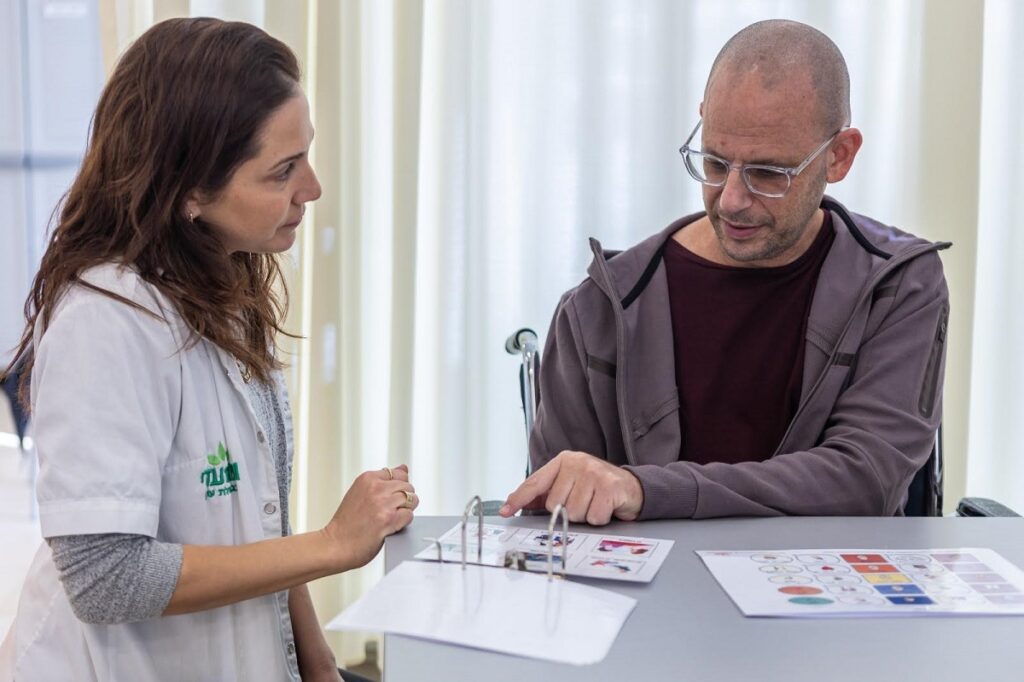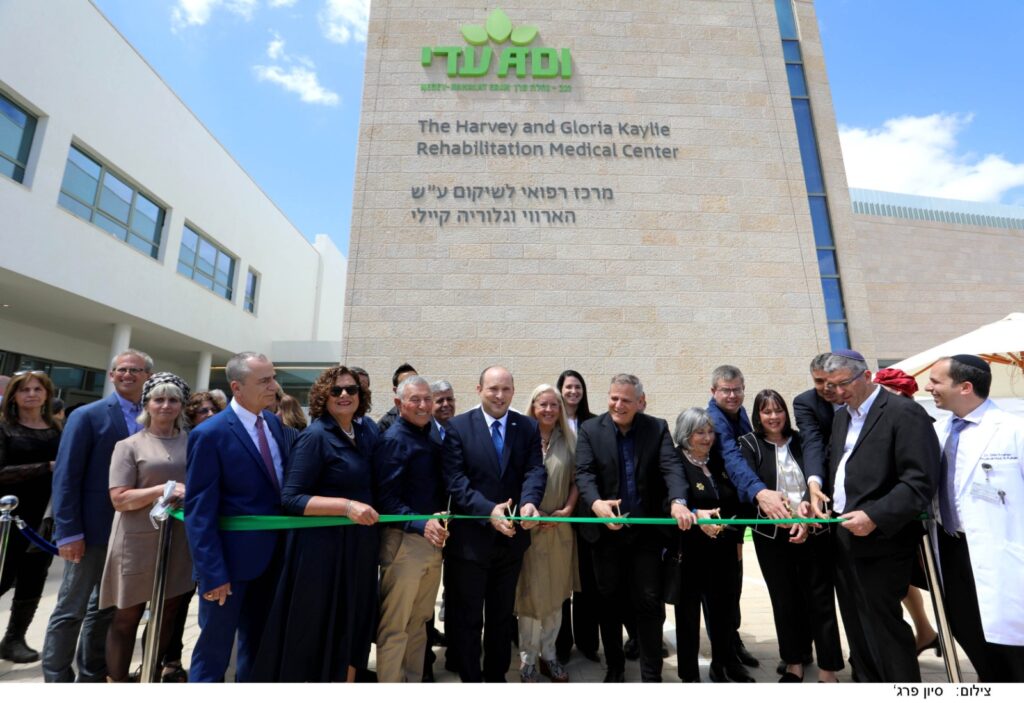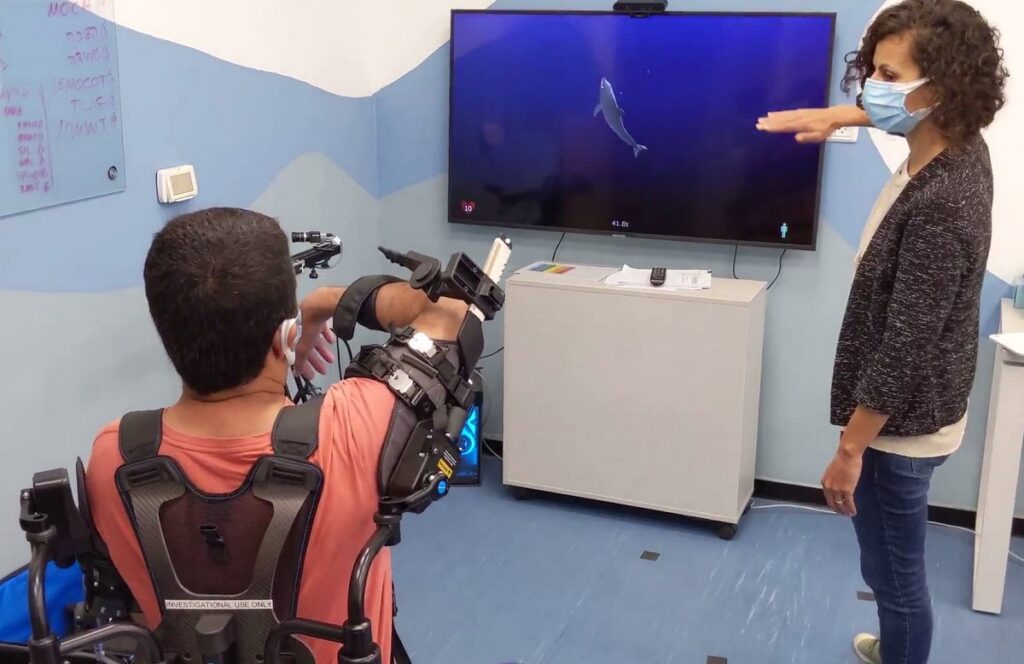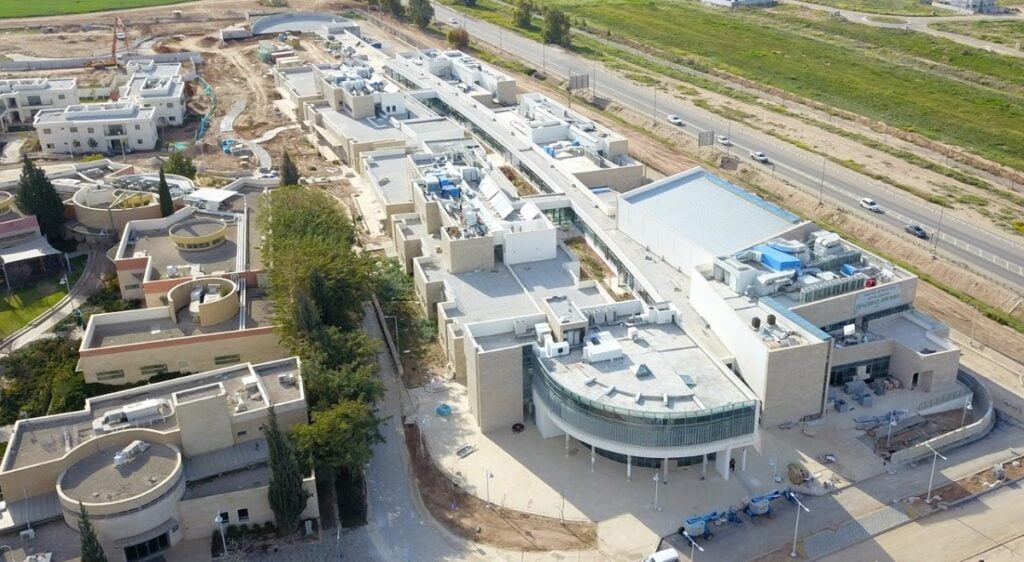ADI Negev-Nahalat Eran, a comprehensive provider of residential and rehabilitative care for children and adults with disabilities, officially opened The Harvey and Gloria Kaylie Rehabilitation Medical Center, the first-ever rehabilitation hospital in the country’s Negev region on Tuesday.
Under the auspices of ADI’s rehabilitative village, the hospital aims to establish a state-of-the-art rehabilitation, research, and social center that will establish a model of community-based inclusive health services, increase the number of Israel’s rehabilitative hospital beds dramatically, and bring quality care to the residents of the southern Israel. It also aims to create more housing and jobs in the Negev.
This marks the beginning of a brand new era of medical and economic strength in Israel, a statement from ADI said.
“Until six years ago, there wasn’t even one rehabilitation hospital bed in the Negev, meaning that most of Israel’s citizens weren’t receiving proper rehabilitative care or they had to commute to the center of Israel to receive the care they so desperately needed. This strain on the Negev population can be seen in the average lifespan, which is seven years less for residents of the south,” Dr. Itzhik Siev-Ner, who will be director of The Harvey and Gloria Kaylie Rehabilitation Medical Center, tells NoCamels.

Israeli Prime Minister Naftali Bennett, Health Minister Nitzan Horowitz, and other distinguished guests attended the opening of the new hospital and were present during a ribbon-cutting ceremony.
The Center “will reverse this trend by offering the highest level of rehabilitation in Israel, advanced technologies for treatment, diagnosis, practice and research, a wide variety of outpatient rehabilitation clinics, and specialties like Oncological Rehabilitation and movement disorders,” he explains.
Also, there are only 850 rehabilitation hospital beds available to Israel’s nine million citizens, and none of them are in the Negev region, according to ADI. As a result, residents of the south requiring inpatient rehabilitation are hospitalized in the center of the country, placing a burden on families, who must travel long distances and disrupt their personal and professional lives to be there for their loved ones.
By providing inpatient and long-term outpatient rehabilitation services and treatments that were previously nonexistent in southern Israel, the Center will help keep families together throughout the rehabilitation process while also immersing them in the village’s inclusive environment. While the hospital will initially feature two 36-bed wards for Neurological and Orthopedic Rehabilitation, a third 36-bed ward for Geriatric Rehabilitation will be added within one year, bringing the total to 108 beds.

“The opening of the rehabilitation hospital, only the third of its kind in all of Israel, is a welcome development for the residents of the Negev,” said Siev-Ner in a statement, “By opening sub-departments with innovative specialties in Neurological and Orthopedic Rehabilitation, we will have uniquely skilled teams that will provide the very best care in every area of rehabilitation.”
The hospital will be the centerpiece of ADI (formerly ALEH Jerusalem and ALEH Negev-Nahalat Eran), a rehabilitative village located near the city of Ofakim that covers 25 acres and his home to 170 residents with severe disabilities. The village also has 160 special education students that come to use the facilities and some 40,000 treatment to individuals in need which include a hydrotherapy pool, a therapeutic horse farm and petting zoo, a green care farm and more. Over 500 professional staff, including doctors, nurses, therapists, and special educators and hundreds of volunteers are there to help. The village includes the name Eran after the son of the village’s founder and chairman Major General (Res.) Doron Almog, who had severe autism and developmental delays. The village, founded in 2005, was inititally created as a place for Eran to live and thrive, but Eran didn’t have the chance to enjoy it for long. He passed away from Castleman’s disease in 2007 at age 23. Almog has said that his legacy gives others the chance they need to reach their greatest potentials.
It was always part of Almog’s extended vision for the village to have a functioning hospital within its community for inpatient and long-term outpatient treatment and all stages and levels of disability.
Sign up for our free weekly newsletter
Subscribe“We believe that the residents of the south deserve the same care as those in every other part of the country, and we believe that we can set the bar higher for rehabilitative care. This village was founded on the principle that a person is a person no matter what, and this hospital and translational research lab are finally starting to bring our full vision into view,” Almog tells NoCamels.

“By establishing the first-ever rehabilitation hospital in Israel’s south, we will be able to expand our reach and deepen our commitment to empowering those touched by disability and their families while also making the Negev bloom in every way imaginable,” he added in a statement.
“In the last several decades, there have been no significant breakthroughs in medications for rehabilitation, there was nothing that made the process of recovery faster and better. So, that is our goal: to enhance the power and efficacy of rehabilitation and expedite the process of recovery.”
“At its core, rehabilitation is a team effort between doctors, nurses, physical therapists, occupational therapists, speech therapists, social workers, psychologists and the rest of the medical team with the goal of returning the patients to the highest level of independence and to return them to their lives and their families. If medicine adds years to life, rehabilitation should add quality to those years of life. That is our focus each and every day,” said Siev-Nir.
Research lab and sports tech center
In September 2014, the government passed a resolution that deemed the establishment of the rehabilitation hospital crucial to the vitality of the Negev region and matched the money raised for the landmark project. Due to the unwavering support of local ministries, the Jewish National Fund – USA (JNF-USA) and key international contributors like the Kaylie Foundation, the hospital’s first two wards, an administrative hub and a sports therapy center will already begin admitting patients later this month.
The Translational Neurorehabilitation Laboratory, nicknamed the “Negev Lab” and already existing in the village, will be moved to the rehabilitation hospital’s complex within the next year. This interdisciplinary lab, established by the Ben-Gurion University of the Negev (BGU) and the village, focuses on leveraging neuroscience and rehabilitation research to propel rehabilitation services to a new level. The lab research is driven by both basic science and patients’ unmet needs, advancing neurorehabilitation and maximizing the physical and cognitive potential of people suffering from brain damage and motor disabilities.

The laboratory will develop and provide outstanding research-based care for patients and contribute to the growth of medical and technological professions in the Negev community. Dr. Simona Bar-Haim, the lab’s founding director and a member of the Department of Physical Therapy in the Faculty of Health Sciences at BGU, envisions the lab as both a treatment center and an entrepreneurial hub, where technologies from around the world can be tested and receive feedback from people who use them. The Israel Innovation Authority is funding part of the research, she says.
“We aim to reduce the gap between rehabilitation treatment for people with brain injuries and cutting-edge research in neuroscience. We plan to turn innovative research into practical tools for the diagnosis, prevention, and treatment of motor and cognitive disabilities. Our common goal is to make the Negev an Israeli and international center of excellence in rehabilitative therapy,” Bar-Haim tells NoCamels.
“Putting a research lab in a rehabilitation village makes a lot of sense. We can go directly to the residents and patients and ask them what their needs are. We can also test out our technologies, which we make sure are fun and pleasant, and get immediate feedback,” she says, “ADI Negev-Nahalat Eran is the ideal place to see what happens when people spend many more hours rehabilitating.”
“I envision the Negev Lab and The Harvey and Gloria Kaylie Rehabilitation Medical Center as the core of the future National Rehabilitative Institute of Israel,” she adds.
Related posts

Israeli Medical Technologies That Could Change The World

Harnessing Our Own Bodies For Side Effect-Free Weight Loss

Missing Protein Could Unlock Treatment For Aggressive Lung Cancer




Facebook comments